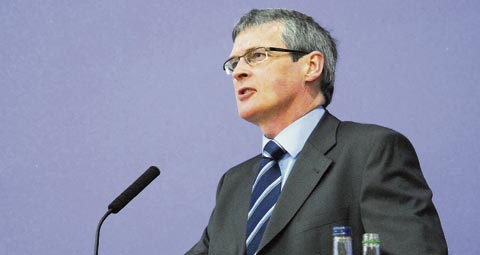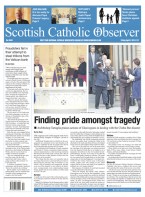BY Ian Dunn | February 21 2014 | ![]() 0 COMMENTS
0 COMMENTS ![]() print
print

Government rejects anti-Catholic petition
Publication Date: 2014-02-21
MSPs called to task for not challenging bias of bid to oust religious reps from education committees
MSPs on the Scottish Parliament’s Petitions Committee have been roundly condemned for putting out to consultation an education petition that contained anti-Catholic language without challenging it.
The Scottish Government last week found that the petition by the Secular Society of Edinburgh—which seeks to bar religious representatives from council education committees—had no merit. The committee, however, has still to make its recommendation and a member’s bill is also likely to raise the issue again in the near future.
The original petition displayed particular hostility to Catholic representatives, alleging their loyalty to Scotland was suspect as they were representatives of a ‘foreign power based in Rome.’ Despite this petition language being compared to anti-Catholic tracts of the 1920s, the petitions committee did not question it when agreeing in January to look further into the issue.
Michael McGrath, director of the Scottish Catholic Education Service (SCES), said he believed parliamentarians had a responsibility to challenge ‘unjustifiable claims’ and they had failed to do so in this case.
“That language should have been challenged,” Mr McGrath said. “Do we really want this to be the tone of the debate? I think the Catholic community needs to know MSPs aren’t always responding appropriately to this kind of statement.”
The Scottish Catholic Education Service, in its official response to the committee’s decision, said it was ‘disappointed’ MSPs failed to challenge the use of such ‘offensive and inflammatory language.’
“Such rhetoric feeds only the baser instincts of some in our society who need little encouragement to express anti-Catholic sentiments,” the SCES response says.
The petition was last week dismissed in the Scottish Government’s response, which state that ‘ministers support the involvement of religious representatives in the decision-making process by councils in relation to education and do not have any plans to change the existing provisions.’
The Scottish Government will also closely examine the forthcoming member’s bill proposed by John Finnie MSP, Shirley Jackson, the Scottish Government’s policy officer, said. Mr Finnie’s proposals would remove ‘the statutory obligation on councils to appoint religious representatives to education committees and remove voting rights from unelected members of all council committees, as well as making other provisions regarding how councils conduct their proceedings.’
The petition to remove religious representation from education committees has also been condemned by parents and parents’ groups.
Mhairi Lloyd, chairwoman of the parent council of St Leonard’s Primary School, East Kilbride, says in her submission to the committee: “For a country, whose education system is admired all around the world, it seems detrimental to the fundamentals of our Scottish education system that the religious beliefs of our country be ignored.”
— This story ran in full in the Feb 21 edition print of the SCO, available in parishes. Report praises religious education in Catholic schools, page 3 of this week’s SCO











